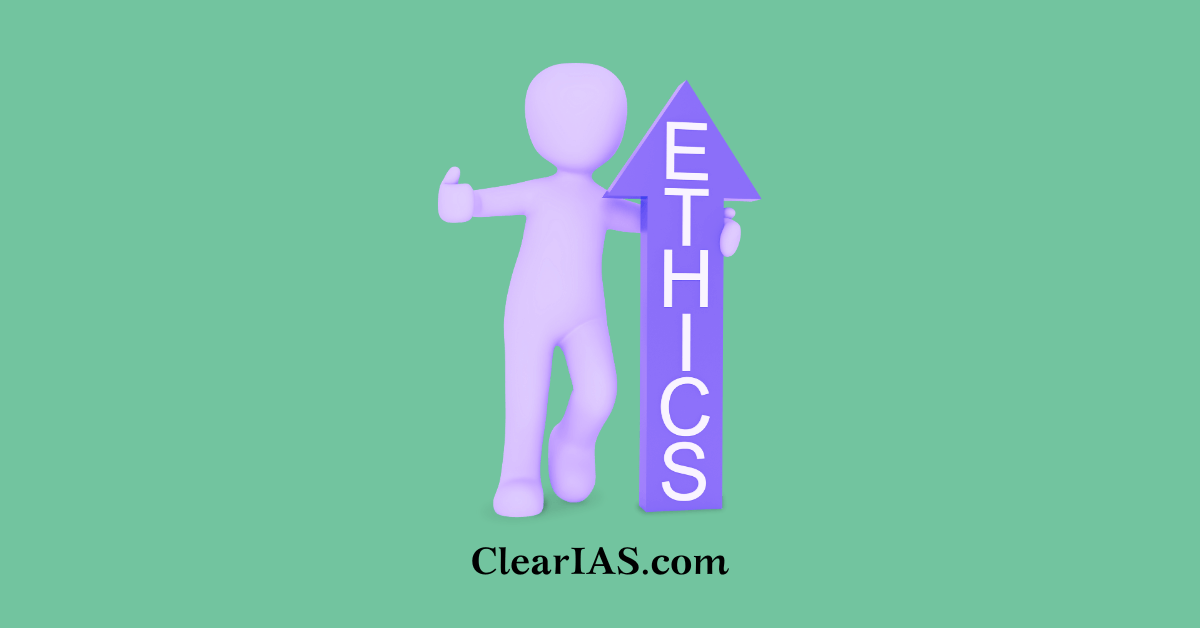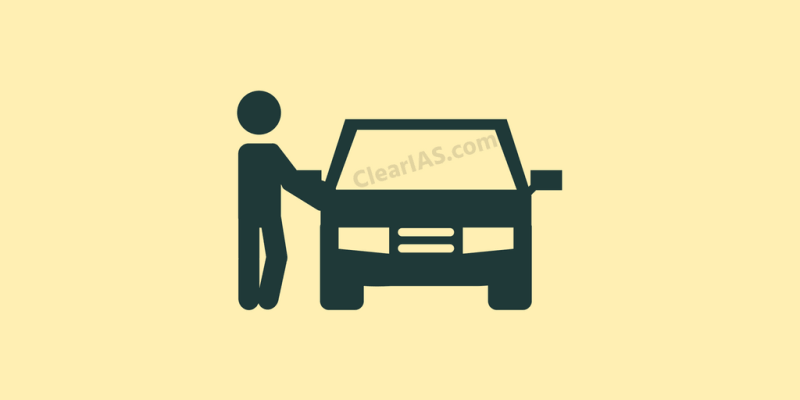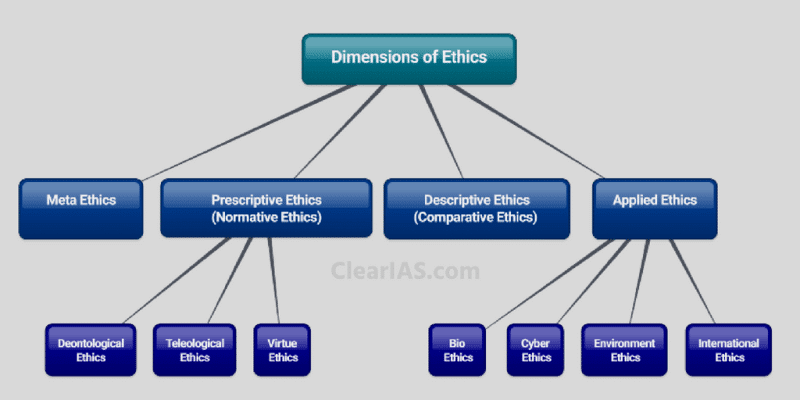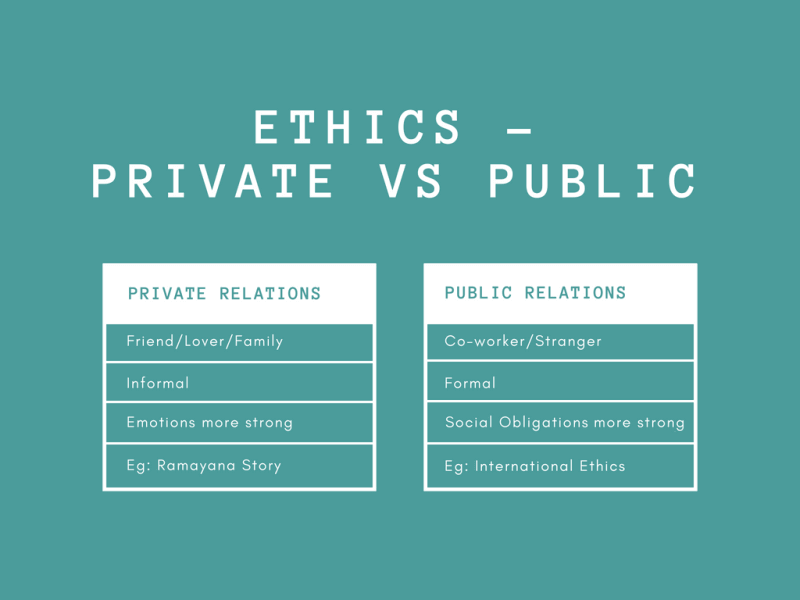
Ethics is the study of what is right or wrong in human conduct.
This is a branch of Philosophy which studies moral principles.
Hence, Ethics is also known as Moral Philosophy.
Ethics Definition
Ethics is a branch of philosophy which deals with what is right and wrong concerning human conduct.
Ethics involves philosophical reasoning about what behaviours society should consider right or wrong.
Example of Ethical Principle: The principle of confidentiality in Medical Ethics.
The principle of confidentiality in medical ethics dictates that information between a patient and a physician should be kept private, respecting the patient’s autonomy and trust.
Morals Definition
Morals are personal principles on which one’s judgments of right and wrong are based.
Morals involve reasoning on a personal or individual level.
Individuals use moral reasoning to what they believe is right or wrong based on their values, experiences, and personal beliefs.
Example of Moral Principle: Personal belief in the values of Equality and justice at a time when society believes in racial discrimination.
Faced with the realization that complying with the law or societal norm would perpetuate injustice, a person is compelled by their moral convictions to take action. This might involve participating in peaceful protests, engaging in acts of civil disobedience, or finding other ways to resist and draw attention to the injustice, despite the potential legal repercussions or societal disapproval.
Ethics vs Morals
Many people use the words Ethics and Morality interchangeably. However, there is a difference between Ethics and Morals.
| Aspect | Ethics | Morals |
| 1 | Definition: Ethics are the rules of human conduct recognized in a particular group, society, culture, etc. | Definition: Morals are principles on which one’s judgments of right and wrong are based. |
| 2 | Source: Usually stems from external sources such as society, culture, religion, or profession. | Source: Derived from an individual’s personal beliefs, values, and principles. |
| 3 | Flexibility: Can be more flexible and adaptable to various situations. | Flexibility: Tend to be consistent and unchanging over time for an individual. |
| 4 | Scope: Often applies to groups or societies. | Scope: Generally applies to individuals. |
| 5 | Examples: Professional ethics in medicine dictate a standard of conduct for doctors. | Examples: A person’s morals might lead them to believe it is wrong to lie, regardless of the situation. |
| 6 | Who enforces: Often enforced by an external body or authority, such as professional organizations or laws. | Who enforces: Enforced by personal conscience and reflection. |
| 7 | Whether Objective or Subjective: More objective, aiming for a common ground among members of the society or group. | Whether Objective or Subjective: More subjective, varying significantly from one person to another based on personal belief systems. |
| 8 | Whether Public or Private: Public – Ethics are more visible and discussed within the context of society and specific groups. | Whether Public or Private: Private – Morals are more about personal internal beliefs. |
The individual may not be always right. Society too!
Even though an individual may have their own personal belief systems, it may not be always right.
It may not be good for the society as a whole as well.
Similarly, even though Ethics is based on the collective reasoning of a group, that too may not be always right.
A group can also go wrong.
However, as Ethics involves the collective reasoning of a large group of people, Ethics can be said to be comparatively reliable and time-tested.
Having said that even within the scope of Ethics, personal decision-making is still needed to solve various ethical dilemmas.
Ethical Case Study: Confidentiality in Medical Ethics
Let’s take a special case connected with Confidentiality in Medical Ethics.
Situation:
A doctor treats a patient who has a condition that, while not immediately life-threatening, could potentially endanger the patient’s family members if it is genetic.
The patient insists that this information remains confidential and not shared with their family.
Ethical Principle:
The principle of confidentiality in medical ethics dictates that information between a patient and a physician should be kept private, respecting the patient’s autonomy and trust.
However, this principle may conflict with the ethical obligation to prevent harm to others (non-maleficence) if the patient’s condition poses a significant risk to family members.
Ethical Decision-Making:
In this case, there is a conflict of two ethical principles in action – (1) confidentiality in medical ethics and (2) avoiding harm to others.
In this scenario, the doctor must navigate the ethical dilemma by weighing the importance of maintaining patient confidentiality against the potential harm that might come to others if the condition is not disclosed.
This decision-making process would involve considering the severity of the potential harm, the likelihood of the harm occurring, and the patient’s autonomy and wishes.
Outcome:
The ethical course of action would vary depending on specific circumstances, such as the nature of the condition, the laws and guidelines governing patient confidentiality, and the availability of preventive measures for at-risk family members.
The doctor might seek guidance from ethical frameworks provided by medical ethics committees or professional guidelines, which could suggest a path that balances respect for patient confidentiality with the duty to prevent harm to others.
This example demonstrates how ethical principles are applied in complex, real-world situations, requiring professionals to navigate dilemmas where competing ethical values must be balanced to make justifiable decisions.
Let’s focus our attention towards ethics!
As I said before, morals are connected with personal belief systems about what is right or wrong.
Even though it may be right and relevant, we are more bothered about the established principles and values of right and wrong of a larger group by a larger group for a larger group.
Examples – Ethical standards for media persons, lawyers, doctors, civil servants, politicians etc.
Ethical Case Study: The Duty to the Public in Civil Service Ethics
Let’s try to solve another case study. This involves a whistleblower’s dilemma connected with Civil Service Ethics.
Background:
A civil servant named Alex works in a government agency responsible for environmental regulation.
Alex uncovers evidence that a major corporation, which is a significant contributor to local employment and economic growth, has been secretly violating environmental laws by dumping toxic waste into a nearby river.
These actions pose a serious risk to public health and the environment but have been overlooked by some of Alex’s superiors, possibly due to the corporation’s influence and the economic benefits it brings to the region.
Contradictory Ethical Principles:
- Duty to the Public: As a civil servant, Alex has an ethical obligation to protect public interests, including health and environmental safety.
- Loyalty to the Organization: Alex is also expected to be loyal to their agency, which includes following internal protocols for reporting issues and not bringing negative attention to the organization or jeopardizing its relations with important stakeholders.
The Ethical Dilemma: Alex faces a dilemma between reporting the corporation’s illegal activities, thereby protecting public health and the environment (duty to the public), and adhering to organizational loyalty by handling the matter internally, which has so far led to inaction and might continue to do so.
Steps to Solve the Ethical Dilemma:
- Gather Comprehensive Evidence: Alex ensures they have collected undeniable evidence of illegal activities and the potential harm to the public and environment.
- Consult Internal Policies and Legal Advisement: Before taking further action, Alex reviews the agency’s policies on reporting misconduct and seeks advice from the legal department to understand the implications of whistleblowing, both for themselves and the organization.
- Attempt Internal Resolution: Alex tries to address the issue through internal channels, presenting the evidence to higher-ups not previously involved in the oversight, to give the organization a chance to correct the issue internally.
- Evaluate the Response: If the agency takes decisive action to investigate and mitigate the corporation’s environmental violations, Alex’s ethical dilemma might be resolved internally. However, if the response is inadequate or dismissive, Alex must reassess their options.
- External Whistleblowing (if necessary): Should internal efforts fail, Alex considers external whistleblowing as a last resort. This involves reporting the violations to external authorities, like environmental watchdogs or the media, understanding the potential risks to their career but prioritizing the duty to the public.
- Seek Protection and Support: If whistleblowing externally, Alex ensures to utilize legal protections for whistleblowers, seeking support from organizations that protect individuals in such situations.
Reflection:
This case study highlights the complex nature of ethical dilemmas faced by civil servants, who must often navigate between competing loyalties to their organization and their duty to the public.
Solving such dilemmas requires a careful balancing of ethical principles, a thorough assessment of the potential impacts of different actions, and a commitment to acting in the best interest of the broader community.
Ethics = Moral Principles (Values) + Reasoning.
To put it in simple terms, Ethics = Moral Principles (Values) + Reasoning.
To have an ethical viewpoint, you should be able to give some reason for it. Yes, Ethics is Moral Philosophy, and Philosophy is all about reasoning 🙂
For example, you might feel that it is wrong to steal, but have you ever thought about why it is wrong to steal?
If you have an ethical or moral viewpoint on it, it should be based on some sets of arguments and analysis about why it would be wrong to steal.
Ethics and Morals – An Analogy with a Car Driver and an Automobile Engineer

Let’s take the case of a car driver and an automobile engineer. The car driver knows how to drive a car, but he may not know the engine mechanism or design principles. However, an automobile engineer is concerned with how the car works, and the principles involved.
Connecting the above example with ethics and morals, you can see that following something mechanically (blindly) is just like driving a car without understanding the working principles of the engine. But if you follow ethical or moral principles – you would be using reasoning and analysis (just like the automobile engineer in the above example) to understand the situation/case better. If the engine starts to create trouble, the engineer may be able to use the problem-solving approach as well.
Ethics and Human Interface – Topics Covered:
- Essence, determinants and consequences of Ethics in human actions
- Dimensions of ethics
- Ethics in private and public relationships
Essence, determinants and consequences of Ethics in human actions
Ethics is all about reasoning about how one should act in a given circumstance – ie. how to do the right action.
Essence of Ethics
Ethics is the study of morality. The essence of Ethics (the core of ethics) is to understand those philosophies which guide us in determining what is right or wrong.
Determinants of Ethics
Determinants are the sources from which the ethical standard arises. There are multiple determinants of ethics like
- Religion
- Law
- Society
- Individual
- Knowledge
- Time
Consequences of Ethics
A consequence is the outcome of any act. Doing good with proper reasoning (being ethical) has many positive consequences like
- Safeguarding the society.
- Feeling good.
- Creating credibility.
- Satisfying basic human needs etc.
However, being unethical has many negative consequences like
- Loss of trust.
- Nepotism.
- Corruption.
- Crimes etc.
Read more: Essence, determinants and consequences of Ethics in human actions
Dimensions of Ethics

Ethics is not just a theoretical science, it has a lot of applications in day-to-day life. Being multi-dimensional in nature, ethics is divided into four main branches. They are:
- Meta-Ethics (Ethics about Ethics)
- Prescriptive Ethics (Normative Ethics)
- Descriptive Ethics (Comparative Ethics)
- Applied Ethics.
We will see the different branches of ethics in detail, in the next post – Dimensions of Ethics.
Ethics in Private and Public relationships

Individuals should be ethical in both private and public relationships. In doing so, they should also try to achieve the right balance between private and public ethics.
Ethics in Private Relationships
Private relationships largely involve relations with family and friends and hence are informal in nature. Private relationships are often driven by emotions and not by reasoning. This can result in unethical practices.
For example, helping your friend to cheat in an exam (unethical). Also, remember the Ramayana story where Kaikeyi tried to put her son Bharata on the throne, ahead of Rama – the elder son of Dasharatha (unethical).
Ethics in Public Relationships
Public relationships involve relations which are formal in nature. This can include co-workers, government officials, or strangers. There can be legal or social obligations as well.
Ethics in public relations can come into play at:
- Social Ethics – tolerance towards other sections, peace and harmony etc.
- Political Ethics – constitutional ethics, national interest etc.
- Organisational Ethics – impartiality, honesty, hard work, efficiency, corporate governance etc.
- International Ethics – ethics in diplomacy, respecting international treaties etc.
Read more: Ethics in Private and Public Relationships
ClearIAS Ethics Course for UPSC CSE (Video Course)
If your goal is to expedite your learning of Ethics, Integrity, and Aptitude through a video course, ClearIAS offers a highly popular course tailored for this purpose.
To gain deeper insights into the ClearIAS Ethics Course designed for UPSC CSE, click here for more details.
By enrolling in the ClearIAS Ethics Video Course, you can effortlessly grasp the principles, philosophical aspects, and effective strategies for tackling case studies.






Very useful content for beginners …..pls give this type of useful content for other subjects also…..
Thank you for the feedback. Yes, we provide easy-to-learn contents for all subjects. More articles coming up.
Thanks team clearias.. very helpful
Thank you for the feedback. Great to know that the article helped you. All the best!
I had been reading different books to get some coherence, and still nothing made sense
Until your article came to the rescue .
Thank you so much sir for such lucid explanation. 🙂
Great to know that our way of presentation suits your line of thinking. All the best!
Yes clear ias your way of explaining is excellent, i think you know that how we will understand the topics.
How to download clear ias ethics notes
Very good and lucid. Please cover the entire Ethics syllabus.
Sir I want to IAS officer but I cannot how to prepare in IAS so please help
Wow, I am amaze to see such a way of explaining ethics. Thank you clear ias your efforts are doing much for us. I have one question, are these notes sufficient ?
It’s really so helpful .
U made the paper interesting for me just in a glance.
Thank u Sir😊
Thank you so much for this. Lexicon is such a headache. I was avoiding GS 4 for so long. Very simple language and easy to understand flow charts.
I’m preparing for 2020. Firstly I would like to say gratitude thanks all clearIas.com members. This website is very beneficial for me it has helped lots of, to understand prelims, mains syllabus, and strategy.
Sir can I get these compiled ethics notes in a pdf?
Thanks for your information . Like this give all related topics for CSE main examination .
I had learned this one in my coaching also ..bt here is better & simple explanation ..thanku so much👍👍👌
Impressive, good job and thanks for sharing such a good blog.RO Water Purifier Services, Alkaline Water Machine Sale and Service
Thank you sir, for giving such wonderful material…..it really help us
Very good content.. I was searching for so long about ethics but no explanation could beat this one.
Thanks clearias✌️
Best content….. So lucky and glad I found it.
Thanks to all the members of clearias for keeping the words very simple so that we can easily understand the whole syllabus
Thanks again
Lucid in nature
Examples are well versed
Thankyou so much 🙏